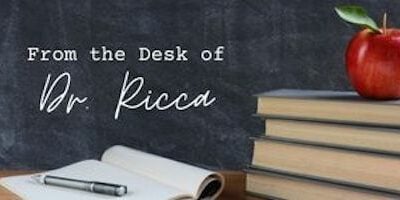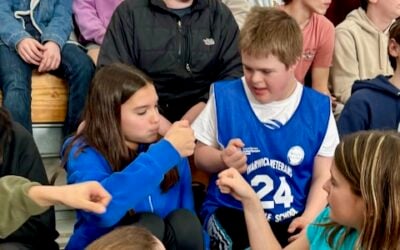I once told a group of parents that preschool prepares kids for the elementary grades, which in turn gets them ready for middle school and from there to high school. Then it is off to college. College of course prepares students to drink, have sex, go to sporting events, pay back enormous loans and seek employment in a field that had nothing to do with their degree. Perhaps this is a bit simplistic, but I was trying to point out a treadmill form of learning that is pervasive these days. This treadmill is steeped in history and tradition. It is also antiquated and costly (to the tune of up to $45,000 per year when speaking of college). Oh yeah, despite all of this some pretty good learning goes on (mostly due to human nature). With this said, too many learners are having a hard time staying on the treadmill. We can do better.
In many ways we are at a crisis point in how young learners are to be educated. All day kindergarten, standardized testing, Common Core standards, technology, along with the cost of college, all confront students and their parents with an assortment of challenges.
Sometimes confusing, often expensive, navigating through the latest fads, methods, standards and trends now is tied to politicians and reformers, as well as testing companies. All the while, the kids get lost in the shuffle.
Where did you learn to walk? Where did you learn to speak, count, get dressed, use a spoon, read and ride a bike? Chances are pretty good these (and many other things) were learned at home or your neighborhood. In fact, without many of these being learned – success at school would prove quite difficult. While school provides important skills and information for learners, it is certainly not the only place where an acquisition of knowledge takes place.
Oftentimes a crisis can offer opportunities. This is especially true when it comes to how we educate young people. Many are now crying out for new information, innovation, delivery models and lower costs. Also, due to new job markets, technology, a shrinking world and the fact that people change careers numerous times over their lifetime, what constitutes learning, as well as skills development, perpetually evolves.
Pedigree learning has a long history of acceptance. Those who have gone to Princeton, Harvard, MIT, Stanford, etc., are considered smart, while those attending other institutions are not so in descending order (based on a school’s reputation). Those who do not go to college are “smart too,” in their own way. These are the people that fix your car, roof houses, deliver mail, provide stay-at-home parenting and join the military. An elitist thought process has been etched into our academic worldview for years. I cannot begin to tell you how many youngsters have felt “less than” because their skill set could not be measured by traditional schooling. On top of this, young learners are often categorized and grouped based on tests. Such dynamics can have a lifetime impact.
Coming soon a paradigm shift will sweep across the educational world. Some of this will come from necessity. A portion might be due to academic availability through technology. Intellectual hubris and antiquated ideas play parts as well. Already, some districts are looking at embracing new models that encourage working in teams, critical thinking, interdisciplinary cooperation, flexible schedules, internships and re-examining the college experience. I hope this will be increasingly encouraged.
For a number of years I have asserted that schools actually created many societal problems. Chewing gum in line, talking in class, skipping school, wearing a hat, cell phone use and not paying attention, have been, or continue to be, ways to get into trouble over a 180-day period. On top of this, an abundance of measures that promote conformity and compliance do more to curtail learning than encourage it. The overreliance on standardized tests and Common Core standards that limit academic curiosity make matters worse. Then when you have finally graduated high school, college loans await and trying to find a job in your field can prove futile. At least there is drinking, sex and football games at many universities. Absurd perhaps. But let us be honest, if we send kids off to college to prepare them for future employment, is this indeed happening?
About a year ago I asked a group of high school students if they knew what they wanted to do for careers. Of the 20 to 25 kids in attendance, a small portion (say 5 or 6) raised their hands. Then I proceeded to ask, how many of you are planning on going to an expensive four-year college? At least 60 percent of the youngsters raised their hands. According to this logic a lot of money was about to be spent so that young people could discover themselves and then career options. Couldn’t they do this at CCRI?
To me, CCRI makes a lot of sense for kids who struggle to sort things out. It is also a great option for young learners who choose this path anyway. Junior college is less expensive and CCRI has excellent associate degree programs. Also, credits earned are accepted by many four-year schools.
Being good at (high) school does not mean that one has cornered the market on intelligence. It means that you are good at school. Perhaps saving about $45,000 per year, in some cases, makes sense – especially if one is not sure about their direction. OK, you might not get to brag about where your kid is going to school, but they would have a lot less pressure on them (and do not forget that student loan thing). Obviously college can provide wonderful opportunities for learning. However, the present delivery system must be questioned.
We have drunk the Kool-Aid in terms of believing that pedigree educations are of great value. For some, perhaps. For many, it is “20 years of schoolin’ and they put you on the day shift.” Lots of money, all too often resulting in minimal reward. Prestigious universities have their place – but learning occurs elsewhere as well.
Over time, many schools have become academic silos surrounded by moats. Because of this, change comes slowly. The world now calls for critical thinking, being able to work in teams, having the ability to engage diverse populations and the willingness to adapt. Basic skills are necessary for sure, but teaching people how to use information in ways that create viable paradigms is more and more essential.
The commodification of education has gotten to the point where money has created absurd advantages. Just look at the districts with the highest standardized test scores if you don’t believe me. The playing field is not level for all.
Goethe once asserted, “The highest to which man can attain is wonder.” I often wonder, where is the wonder? Where is the creativity? Where is the fun? The perfunctory nature of today’s delivery system has truncated many of these dynamics.
Learning is a lifetime endeavor. When encouraged, it flowers and brings a spirit that enlivens the world. Steven Hawking has been on a long quest to discover “a theory of everything” that links the components of the universe. In an odd and simplified way, there is a unified theory of learning as well. Humans desire knowledge. Humans seek knowledge. Knowledge is eternal and cannot be denied. Its possibilities are endless and all we have to do is welcome those possibilities. Lincoln learned at home. Mandela expanded his knowledge while in prison. Frederick Douglas persevered and found a way. Change is upon us and it is going to draw from many places. If embraced, we are in for one exciting ride.
At present, too many are seeing their pursuit for knowledge impeded or minimized. Creative measures that allow all citizens the opportunity to obtain skills necessary for meeting present and future challenges must be considered.
A counselor, Bob Houghtaling works with young people in East Greenwich.
Photo credit: http://www.booostoxygen.com/static/media/blog/images/o-TREADMILL-RUNNING-facebook.jpg






 Subscribe
Subscribe
The most important subject , and one that is being ignored today, is physical education.
Think about it. After all is said and done what are most people doing in their 30’s. 40’s and beyond ?
Going to the GYM. Jogging. Lifting weights. Doing aerobics etc.
Because after all , if you don’t have your health, you don’t have much. Obesity, diabetes, cardio-vascular disease are huge. They will end up costing thousands.
So don’t ignore Physical Education. Latin has been useful also. Never had to use Algebra, Geometry, Trig and calculus once in 70 + years.
Hawk
good point, but lopsided, right ? Just learning Geometry or Algebra can open a whole new world … for some.
This is a great post Bob. As a parent with 2 graduated and 1 still in high school, East Greenwich does an excellent job educating our children. However I’ve since learned that all kids mature at different rates and what works for one doesn’t work for all. EGHS does a great job promoting college prep but there is, for every kid who plans on attending an Ivy League school, another kid at the high school who is struggling to find his/her own path. We do not do any justice for those who are different thinkers and for whom, perhaps, college is not the answer. Combining that with overly competitive, self interested parents and I do think we’re failing a groups of kids who might do better on a different path.
We should offer different learning path to different group of students. EGHS might have done an OK job for average kids, but it has done a poor job for high achieving kids and the kids need extra help.
“but it has done a poor job for high achieving kids ”
I beg to differ. In what way has the school let down high achievers?
Do they have an opportunity to learn?
Are they not learning what exactly? I had a child that was pretty academically gifted – all the AP and honors classes …. not because I did anything (i.e. waived him in) but because that’s what he achieved on his own. My guess if is that a parent who feels something is lacking should try to remember that the school is responsible for ALL learners, not just the “high achieving” ones.
Renu, One of the examples is the highest level math course offered in EGHS is AP Calculus AB. After a student finishes AP Calculus AB in freshman year, he/she does not have an opportunity to take on higher level of the AP math courses as other RI students. Other RI high schools either offer higher level of the AP math courses, or offer outside courses. The school district has a responsibility to educate all the students.
Bob, agreed, good article, but one of the most important learning influences already in HS but even more in College or University are the peers ( ok, professors, too ). And there is a difference between going to a CC or a school which brings students together from all over the world, eager to learn and experience.
I disagree – there are some teens who after graduation may need a year or two of CCRI or of working or of technical school. There’s something wrong with the mentality that all students have to go to college or they’re missing out. Peers are important but so are other life experiences. This is a short sighted mentality that all kids should fit one pattern.
I’d like to see the statistics of the students who drop out their first of college or return to CCRI. I think that they’re more numerous then most parents know.
Right on, Renu. C, CCRI brings students together from diverse backgrounds, eager to learn and experience as any 4 year college does. Frankly, they may be MORE eager to learn as they may be less likely to have ended up there because they were ‘supposed’ to.
Sorry, if you did not understand my comment completely. I DID NOT say – as you assume – that everyone has to go to a 4 year college, but merely stated that peers are an important influence. They will be an important influence no matter where you attend, but not the same quality of influence.
Also, I did not say anywhere that all kids should fit one pattern … where did you get this from ?
Great article…… “First, know thyself” , I guess I would know who said that if I stayed awake during my eight years of college and professional schools at “prestigious’ universities They prepared me well for my professional career but I never knew that working with my hands was a key to my happiness. I was able to ace tests etc in order to gain academic praise but after all, a very important facet of life is knowing what makes you happy at your core. I’m happy that some high school kids can do this but, on reflection, it took me 50 or more years to get to this point and I blame the “system” for this…… I was in the “college prep” group and never was a trade or art career even mentioned as a possibility.
“A parent
Renu, One of the examples is the highest level math course offered in EGHS is AP Calculus AB. After a student finishes AP Calculus AB in freshman year, he/she does not have an opportunity to take on higher level of the AP math courses as other RI students. Other RI high schools either offer higher level of the AP math courses, or offer outside courses. The school district has a responsibility to educate all the students.”
Seriously? In freshman year in high school? Then IMO that kid should probably be in college already and not wasting his/her precious time in high school. Also the idea that I got from this well written post was that learning is lifelong and certainly should be encouraged outside the school – in this case taking college classes. My understanding was that if this came up the parent should take it upon herself to reach out to the math department not place blame on her child being underserved. I hardly think that when the school/student hits the limit to available classes, the parent shoud sit back and wait, the parent too has a responsibility.
Sorry but I hardly can belive that the above example is a regular occurance but a more common occurance that some graduating seniors are not ready and may not be willing to attend traditional 4 year colleges.
I find the irony that some of the posters on this with their examplary children and sky-high achievements, are the very parents who may detract from the students/parents who may not be ready for the college experience.
Renu, Do you know how many parents have talked to Math Department in the past? You asked for an example, but you can’t take the fact…
In 2013, there were 282,814 students took AP Calculus AB exam, there were 104,483 students took AP Calculus BC exam, there were 169,508 students took AP Statistics exam. It is not uncommon for public high schools offer Multi-Variable Calculus, Differential Equation and Linear Algebra courses to high school students. The “genius” is only an ordinary high-achieving kid, the “gifted” child is an average kid if you look outside East Greenwich.
http://en.wikipedia.org/wiki/AP_Calculus
http://en.wikipedia.org/wiki/AP_Statistics